The Breckenridge Outdoor Education Center (BOEC) is dependent on the outdoors in order to provide meaningful and inspiring experiences for the 3,000+ participants we serve annually. Thus it should come as no surprise that one of our core values is to protect the environment. BOEC is committed to operating in a way that has minimal impact on the natural world while maintaining a culture of sustainability throughout the organization. Being mindful about our resource usage and keeping waste out of our landfills is one of the significant ways we are working towards our environmental goals, and Timberline Disposal & Recycling and the High Country Conservation Center (HC3) are helping us accomplish this.
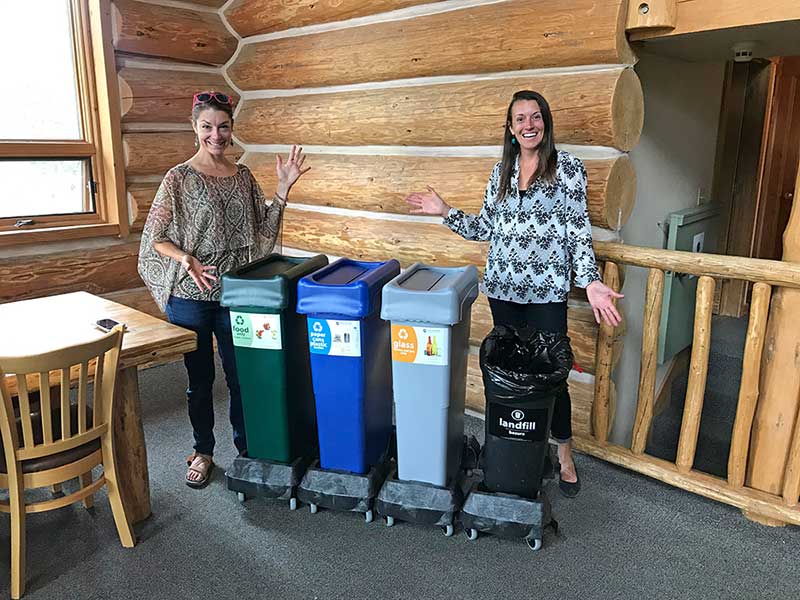
BOEC’s Hallie Jaeger and HC3’s Allie Flynn pose with the new recycling bins.
While Leave No Trace principles have been at the forefront of BOEC’s outdoor programs for many, many years, as the organization grows it is apparent that there’s much more that can be done to enhance the culture of sustainability. In the past year, crucial partnerships between Timberline and HC3 have come together to do just that.
Timberline Disposal & Recycling, a strong community based organization that services local partners in their waste diversion efforts, took one look at the mission of the BOEC, was extremely impressed with the services provided to its participants, and offered to donate single stream recycling, glass recycling and composting at no charge. According to sales manager Coley Campbell, this generous offer was extended to the BOEC so that its important funds can be dedicated to its programs without having the added expense of trash and recycling disposal.
“Just knowing that we’re able to help BOEC put that money towards their root cause and some better programming and better equipment if they need it is our goal,” says Campbell. “We are here to provide support for them on that end and give them a little financial relief so they can put it more towards the kids and people with disabilities.”
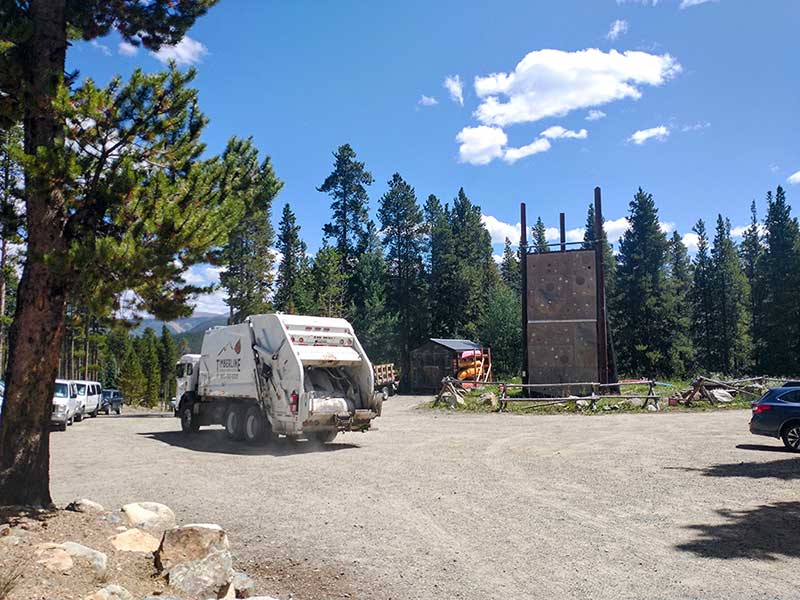
Timberline’s truck picks up recycling at BOEC’s Wilderness Site.
Timberline is a company which is part of the larger conglomerate, Waste Connections, which measures success by the positive impact they have within their local communities. They support more than a thousand organizations through direct contributions, volunteering or fundraising throughout the United States and Canada; something that Campbell and the Silverthorne-based organization truly take pride in.
“Our company culture is based on servant leadership,” he says. “So, really empowering employees to make good decisions from the front line workers up. Again, just trying to keep that close community tie and do what we can throughout the community to help out.”
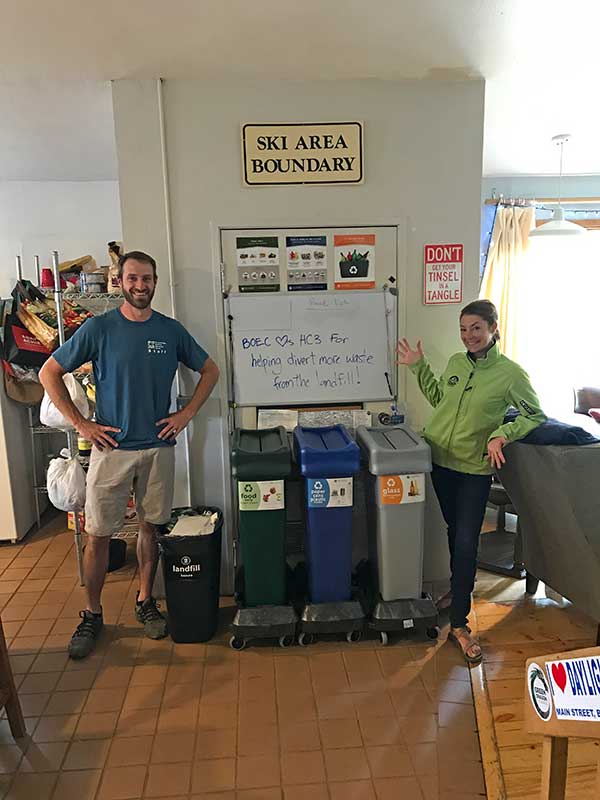
Hallie and BOEC’s Ben Hickman show off the bins.
While Timberline does all of the “heavy lifting” so to say, HC3 jumps in with the infrastructure and education part of the equation. HC3’s mission is to promote practical solutions for waste reduction and resource conservation in our (Summit County) mountain community. Through the Strong Future grant from the state of Colorado, HC3 provides free recycling, glass and compost bins, as well as signage and labels to help Summit County businesses reduce their carbon footprint. HC3 partnering with BOEC is a way to strive towards the community goal to reduce emissions 80 percent by the year 2050. The BOEC is proud to be a part of this important action.
“The BOEC and HC3 have similar views and goals when it comes to the environment,” says HC3 Community Programs Manager, Allie Flynn. “It’s been a breath of fresh air to work with an organization that cares about the environment as much as we do. We get a lot of rejection from businesses who do not want to implement or improve recycling, so it really warms the soul when you find one that does!”

HC3 provides complimentary labels to help prevent contamination.
The complementary labels and bins are the backbone of this program, but without education on how to use them correctly, it’s all for not. Recycling contamination, when materials are not clean or recyclables are disposed of incorrectly, contributes to the abysmal recycling rates around the world today. This is an easy problem to solve. Allie and HC3 hosted a “pizza and recycling” training session for all BOEC employees to assist in this education as the nuances of what materials are and are not accepted here in Summit County can be quite different from where staff grew up or BOEC participants live. After all, recycling rules are completely dependent on the brokerage of materials between local markets which is constantly changing. According to Flynn, this pizza party and opportunity to ask questions was an extremely important process in the scheme of things.
“It is important to ensure that the entire staff is knowledgeable about accepted materials and can share this information with other staff and participants,” she states. “It was great to connect with BOEC employees on a more personal level and allow them to ask questions about recycling in a safe, non-judgemental forum.”
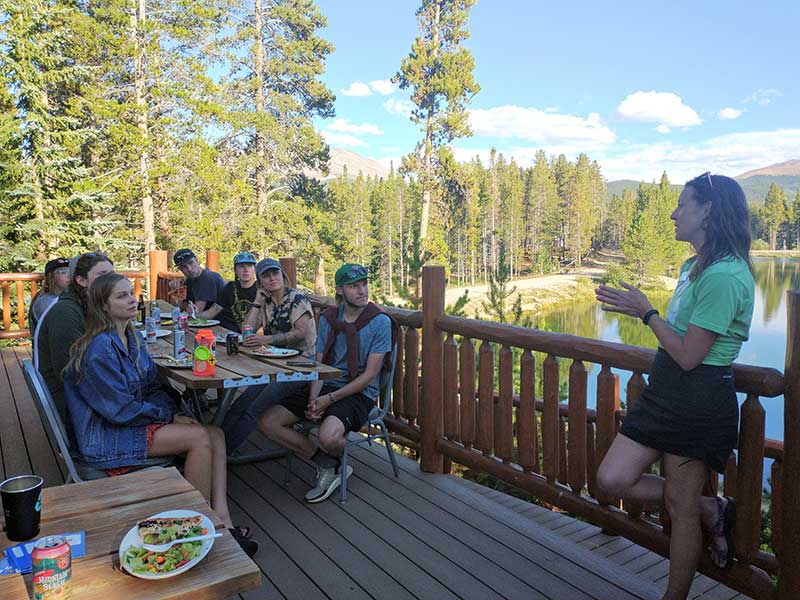
HC3’s Allie Flynn talks to BOEC staff at the pizza and recycling training session.
She continues, “By educating staff, we are also helping to raise awareness not just with the BOEC, but also with anyone the staff socializes with. Through this process, in a way, the BOEC staff has become Zero Waste Ambassadors – in-the-know recycling experts who share their knowledge with family, friends and neighbors.”
As newly appointed “ambassadors,” bins, compost buckets and labels have been provided to the BOEC administration headquarters, BOEC staff housing, the Griffith Lodge, and the Intern Cabin, providing a well-rounded waste diversion program for the BOEC. One integral part of this crucial initiative is the opportunity to compost, recycle and educate BOEC participants during Wilderness programs. Even on week-long river rafting trips down Ruby Horsethief with participants from the Brain Injury Alliance of Colorado, for example, the BOEC staff bring a compost bucket for all food scraps and a recycling bin instead of just the trash “ammo” can. If BOEC can teach people with special needs and disabilities to invest the extra time and energy to divert waste out on raft trips, anyone can. Plus, BOEC participants are from all over the United States, so this effort helps extend beyond local borders. Allie Flynn extrapolates.
“Education about composting for BOEC’s participants is so important because it’s not necessarily a widely-practiced routine,” she says. “If we can share with folks from other communities, they might return home to either find out about a program in their community that they did not previously know about, or encourage their community to start a composting program. While HC3 focuses solely on Summit County, we are happy to share our practices and program information with people from outside our municipality.”
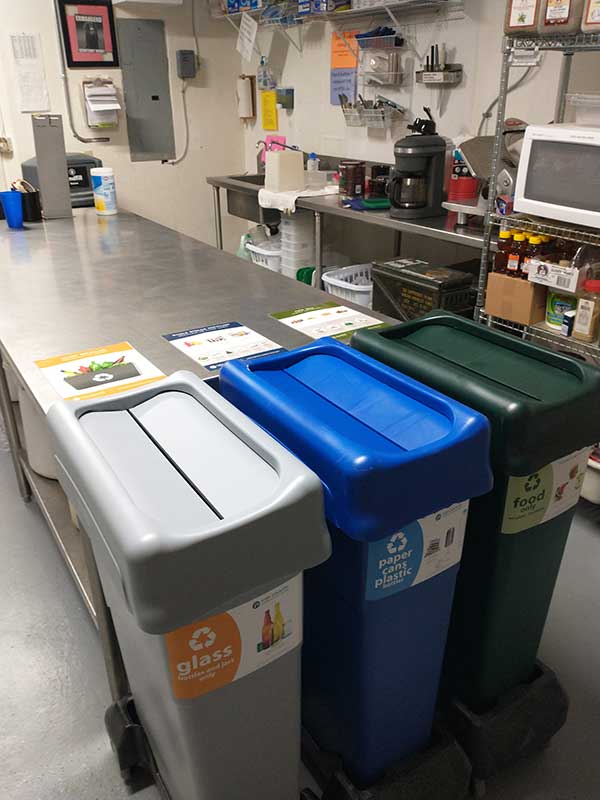
Recycling at the Griffith Lodge.
As you can see, thanks to Timberline and HC3, we are reducing our carbon footprint through effective trash management, recycling and composting, but we’re also helping to educate the participants we serve. Both are important steps in helping to mitigate the effects of climate change.
“We’re just happy to be helping BOEC achieve one of its values,” says Campbell. “Whatever we can do to help provide a service to divert waste and make an impact in our community, we’re all about it.”
BOEC requests everyone look into proper waste diversion tactics. If you’re in Summit County, HC3 is the premiere resource and you can find more information at https://highcountryconservation.org/recycling-summit/. We’re also extremely satisfied with the level of customer service and philanthropic spirit Timberline has provided us.
HC3 and Timberline, thank you for helping us save the planet.

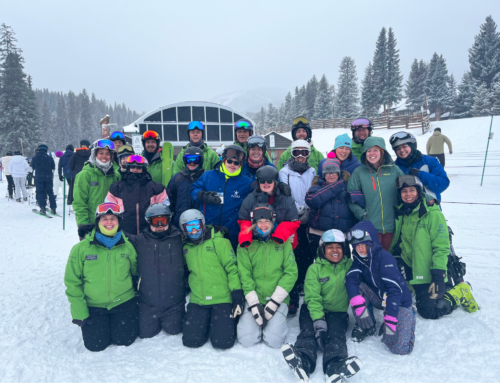
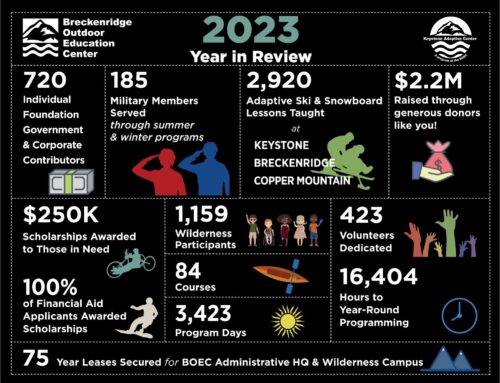
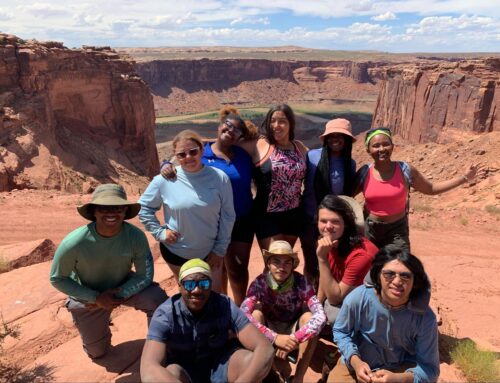

Leave A Comment